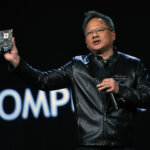So far, China is standing firm against US sanctions

US sanctions imposed on China’s chip sector haven’t slowed the AI industry – even though shipments of Nvidia Corp and Advanced Micro Devices Inc chips, the global standard for developing chatbots and other AI systems, are being restricted.
In fact, US punitive action towards China has only had a minimal impact on the country’s technological advances. Nvidia has created chip variants for the Chinese market that are slowed to meet US rules. Reuters heard that the newest variant, the Nvidia H800 (announced in March) will likely take 10% to 30% longer to carry out some AI tasks and could double some costs compared to Nvidia’s fastest US chips.
The slowed chips are still an improvement for Chinese firms, as predicted by one of China’s largest tech companies, Tencent Holdings: systems using Nvidia’s H800 will cut the time it takes to train its largest AI systems by more than half, from 11 to four days. “The AI companies that we talk to seem to see the handicap as relatively small and manageable,” said Charlie Chai, a Shanghai-based analyst with 86Research.
Despite only Nvidia’s slower chips being available on the Chinese market, progress in areas like AI remains steady; in fact, even the reduced performance available is an improvement for Chinese firms. This is in part because America’s strategy in imposing the new rules was designed not to cause a shock in China that would make the country drop US chips altogether.
If that happened, it would push China to redouble its own chip developments, something that the US fears from its competitor. “They had to draw the line somewhere, and wherever they drew it, they were going to run into the challenge of how to not be immediately disruptive, but how to also over time degrade China’s capability,” said one chip industry executive who requested anonymity to talk about private discussions with regulators.
US sanctions against China won’t hurt AI progress
There are two components to the export restrictions. The first places a ceiling on a chip’s ability to calculate extremely precise numbers, a measure that will limit supercomputers that can be used in military research – an effective action, according to industry experts. However, calculating extremely precise numbers is less important to AI work.
The second limit is on chip-to-chip transfer speeds, which does affect AI; AI models are too large to fit on one chip, so must be spread over several. In fact, often the technology must be spread across thousands of chips, which need to communicate with each other at high speeds.
As recently as two years ago, the industry expectation was that AI systems would only grow. That has not been the case though: the trend is leaning toward making AI training centers smaller and more energy efficient. Systems requiring fewer chips will become common, reducing the necessity for chip-to-chip communications and lessening the impact of US speed limits.
Nvidia hasn’t disclosed the China-only H800 chip’s performance details, but a specification sheet seen by Reuters shows a chip-to-chip speed of 400 gigabytes per second, less than half of the peak speed of 900 gigabytes per second for Nvidia’s flagship H100 chip, available outside China. In regards to AI, many believe this is speedy enough. Naveen Rao, chief executive of a startup called MosaicML that specializes in helping AI models to run better on limited hardware, estimated a 10-30% system slowdown. “There are ways to get around all this algorithmically,” he said. “I don’t see this being a boundary for a very long time — like 10 years.”
While ten years is a long time when it comes to chip evolution, China seems to be taking on the sanctions it faces. Will the US retaliate with harsher restrictions, or is China in for an easy break?










